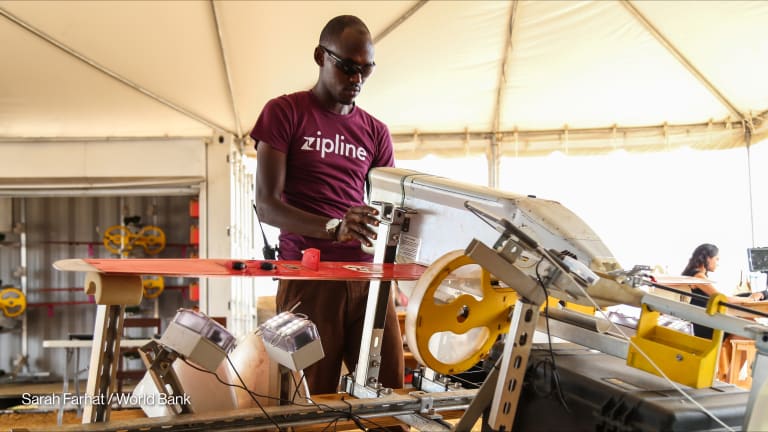
Zipline, a company that delivers blood, vaccines, and other medical equipment using its fleet of unmanned aerial vehicles, is building an end-to-end cold chain distribution capability to distribute COVID-19 vaccines in Rwanda, Ghana, Nigeria, and rural and remote parts of the United States, the company said Thursday.
This will enable the drone delivery service to deliver all leading COVID-19 vaccines at their required temperatures, in precise quantities, and on demand.
Why it matters: Vaccines that require ultra-low temperature ranges, such as Pfizer’s COVID-19 vaccine, require dry ice or highly specialized freezers, posing challenges to plans to transport, store, and distribute doses to hard-to-reach places.
Remote technologies find a role in COVID-19 response
Movement restrictions are isolating health workers and disrupting supply chains. So organizations are turning to drones, video chatting, mobile applications, and other tech solutions for help.
Zipline, which launched in Rwanda in 2016 and announced an expansion to Nigeria this week, ships cold-chain dependent vaccines in the standard and frozen ranges daily and has delivered more than 1 million routine vaccines to date. It also has some experience shipping products at ultra-low temperature ranges, which is more difficult.
“Where you live shouldn’t determine whether or not you get a COVID-19 vaccine,” Zipline CEO Keller Rinaudo said in a press release. “We can help health systems bypass infrastructure and supply challenges through instant delivery.”
Who’s behind it: Zipline says this initiative is a collaboration with an unnamed “leading manufacturer of COVID-19 vaccines.” The partnership builds on Zipline’s work with Gavi, the Vaccine Alliance.
What’s next: Zipline will add ultra-low refrigeration capacity at its distribution centers and conduct end-to-end thermal validation to ensure vaccines remain within their required temperature ranges. The company expects to be ready to deliver COVID-19 vaccines to the areas where it operates in April.


